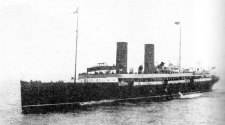
Isle of Man Steam Packet Company's Steamship "Viking"
[Extracted from The Railway Magazine Vol LXIV pp179/183 British Railways and Non-Railway steamers no II ]

Isle of Man Steam Packet Company's Steamship "Viking"
We must now consider the Isle of Man That fascinating little land set in the sea between England, Scotland, Ireland, and Wales-an island which has long relied on private enterprise to maintain communications between itself and the Metropolis-indeed, the welfare of Mona's Isle has long been intimately associated with that of the Isle of Man Steam Packet Company.
The history of this company is an interesting one, dating from 1830, and full of incident, with competition from different sources, but, surviving all attacks, it has kept abreast of the times, and perhaps more than any other private company has maintained cross-channel fleets second to none. Its large paddle-steamers were well known to a former generation, when Empress Queen was perhaps the best known and most popular of all ; she was 360 feet long by 42 feet beam, and had a tonnage of 2,140 gross.
This company has augmented its fleet in two distinct ways: (1) By building new tonnage, and (2) by acquiring steamers from other companies, of which notable instances in the present fleet are Manx Maid (ex Caesarea, London and South Western Railway), Mona's Isle (ex Onward, South Eastern and Chatham Railway), Snaefell (ex Viper, Burns Line), and Manxman (ex Manxman, Midland Railway), four typical examples of popular channel steamers. More recently this company acquired Victoria from the Southern Railway, and Antrim and Duke of Cornwall from the L.M.S.R., all well-known packets.
But it is, perhaps, the new steamers that evoke most interest. The large paddle boats were followed in 1905 by the larger turbine steamer Viking, one of the best known of all Manx steamers, and she positively leaped into public favour, so much so that three years later a still larger turbine boat, Ben-my-Chree, was built, and she had the distinction of being the largest and fastest channel steamer, for she was 375 feet long, and had a tonnage of 2,651 gross, while her speed touched 26 knots. Unfortunately this splendid ship was lost in the war. King Orry, the first geared turbine, though smaller, was a very satisfactory boat, and the most recent addition to the fleet is also a geared turbine steamer, again happily named Ben-my-Chree, and fitted with all modern improvements, including a shelter-deck screened by glass windows, while, as a correspondent points out, she was given a foot more beam than any of the railway steamers prior to the new S.R. steamer Canterbury. She can carry 2,700 passengers on a No. III certificate, and her boilers are oil-fired. Incidentally, both Manx Maid and Manxman have been converted to oil fuel.
In the summer months there are two sailings from Liverpool to Douglas and one from Fleetwood daily, but it is the 3 p.m. steamer that affords London passengers the best connection, the special express, appropriately named "The Manxman," leaving Euston at 10.40 a.m. and reaching Liverpool at 2.30 p.m., with an intermediate call at Stafford. The train is composed of modern L.M.S. corridor stock, and runs at a higher average speed than most of the Liverpool trains, again showing that the private company receives good treatment from the railways. It is very creditable to be able to leave town at a very reasonable hour and yet be in Douglas in time for dinner. To enable passengers to cross to the Island by the 10.30 a.m. boat, it is necessary to leave Euston at 2.35 a.m., or at 1.30 a.m. if it is decided to travel Great Western from Paddington.
An alternative and very popular route to the Island, also maintained by the same company, is that from Fleetwood to Douglas, the short sea route for the passage normally only occupies about 2½ hours. There is no suitable train from London, the service being arranged with the big towns of Lancashire and Yorkshire in view. A fast train leaves Manchester at 8.45 a.m. and reaches Fleetwood at 10.10, calling at Bolton en route. Twenty minutes later the steamer sails, and is due to arrive at the capital of the Island at 1.15 p.m. ; this is certainly an admirable service well adapted to the requirements of the business man of Manchester, who shows his appreciation by taking his family to the " lil islan' " as often as he can.
Nowadays the sailings to the Island are almost exclusively in the hands of this company ; indeed, the présent state of affairs may be regarded as an outstanding case of excellent co-operation between our railways and privately owned steamers.
|
|
||
|
|
||
|
Any comments, errors or omissions gratefully received
The Editor |
||